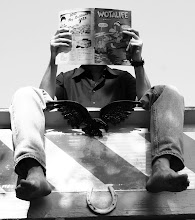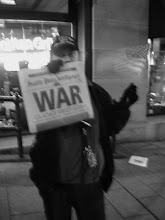
It was early summer, 1981. I was a seventeen year-old high school graduate, living near the small Western Pennsylvania city of Butler.
Named for Major General Richard Butler, a loser in the 1791 Battle of the Wabash River (the worst defeat in U.S. military history), it was a faded, but proud, no-nonsense, predominantly white, working class municipality, birthplace of the Bantam Jeep, the first all-steel railroad car, professional wrestler Big John Studd, and Bret Michaels, lead singer for the rock band Poison. A community steeped in the legacy of its manufacturing past, it was left brewing in its current economic woes. Its main street, imaginatively named Main Street, was less than two miles long, an impoverished stretch of vacant storefronts and dying businesses, buttressed on one end with patriotic car dealerships, the other with an aging steel bridge straddling the second most polluted river in North America. Situated in the middle of this grim gauntlet of collapsing commerce was the Butler Eagle Building, its beaux-arts, white stone eagles perched in testament to past prosperity. The Butler Eagle, one of the few family-owned newspapers in the United States, was a highly-functioning organ of an otherwise expiring system, an eighty year-old daily boasting a circulation of nearly twenty two thousand. It was within these austere walls of parochial journalism that I was to sow the seeds of my future reign of domestic terror.
There I was, on a warm May afternoon, sitting in the editor’s office, perspiring nervously, trussed up in an uncomfortably over-sized tweed wool suit, a copy of that morning’s paper poised unopened on my knee, a cup of unwanted black coffee shaking in my hands. “We’re going to give you Bud Blake’s spot,” the wide-faced and balding, chummy editor explained, slipping into his wide desk drawer the two large pieces of construction board upon which I’d mounted the initial twelve episodes of my masterwork, a daily comic strip entitled Flip Rhodun, one featuring the adventures of a wise-cracking space marine in the 23rd century. “That’s Tiger you’re replacing, you understand,” smiled the editor. “You’ll be on subordination, a trial arrangement. Being printed alone is quite an honor for a young man like yourself.” I simply nodded, my cup clinking on its saucer. One clumsy, sweaty handshake later, I’d naively agreed with the spendthrift, small-time baron of the fourth estate that my first contribution to the history of cartooning was worth more to the people of Butler than me, thus depriving myself the compensation due the creator of a daily comic strip in one of America’s long-standing regional newspapers. For the next eight weeks I gave him the entirety of my creative self, providing a new strip every Monday through Saturday, receiving not a dime for my effort.
My indentured servitude going smoothly, I was more than happy, despite the fact that the transition from teenage doodler to one of America’s “premiere men of the funny pages” was not quite the bonanza of social mobility I had imagined it would be. What attention it aroused among my peers was negligible. I continued turning out my amateurish strips, perpetually bewildered to find them printed each and every day, sitting beside the likes of Broom Hilda, B.C., Mark Trail, and Blondie, until, all of a sudden, at the beginning of my second “story arc”, I was unceremoniously dumped, booted at the urging of two angry letters from purported fans of Mr. Bud Blake. The ride was over, my first career in non-profit cartooning had been cut short. I was so unworthy of my former publisher’s attention, I found it impossible to even retrieve the original art to my forty-odd strips, the editor’s office, and its complimentary coffee and papers, now seemingly closed to me forever. I was locked out, forgotten, washed-up, an inkpot has-been at the ripe old age of seventeen.
Not surprisingly, the experience changed me.
Acquiring a sense of injustice, I soon grew to realize how I’d been utilized by the machinery of an industry that existed, quite literally, to improve its own circulation. I was the “local boy made good” who was quickly made to disappear. I’d entered that regal building an innocent, aspiring boy cartoonist, but I’d left, almost two months later, a man with a grudge, another artist who’d faced the inevitable sparsity of a newspaperman’s soul.
Carrying the sting of this marketplace baptism with me, I strode into the maw of the capitalist system, regularly confronting new villains and fresh adversity, biding my time, secretly plotting revenge as I methodically empowered myself with knowledge that would serve me well, a decade down the road, when I would return to the hallowed halls of The Butler Eagle, this time armed, transformed into a diabolical, terroristic mastermind.
To Be Continued
























































